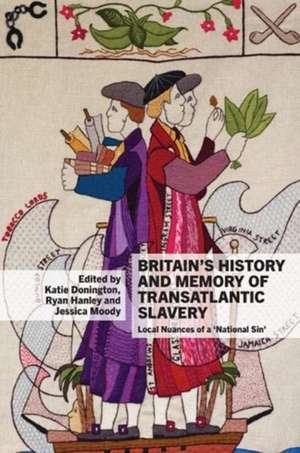Britain′s History and Memory of Transatlantic Slavery – Local Nuances of a ′National Sin′: Liverpool Studies in International Slavery
Autor Katie Donington, Ryan Hanley, Jessica Moodyen Limba Engleză Paperback – 28 feb 2021
Preț: 273.50 lei
Nou
Puncte Express: 410
Preț estimativ în valută:
52.34€ • 55.96$ • 43.64£
52.34€ • 55.96$ • 43.64£
Carte disponibilă
Livrare economică 27 martie-10 aprilie
Livrare express 12-18 martie pentru 31.28 lei
Preluare comenzi: 021 569.72.76
Specificații
ISBN-13: 9781800348677
ISBN-10: 1800348673
Pagini: 285
Ilustrații: 4 Illustrations, color; 13 Illustrations, black and white
Dimensiuni: 156 x 234 x 16 mm
Greutate: 0.42 kg
Editura: Liverpool University Press
Seria Liverpool Studies in International Slavery
ISBN-10: 1800348673
Pagini: 285
Ilustrații: 4 Illustrations, color; 13 Illustrations, black and white
Dimensiuni: 156 x 234 x 16 mm
Greutate: 0.42 kg
Editura: Liverpool University Press
Seria Liverpool Studies in International Slavery
Descriere
This collection brings together local case studies of Britain's history and memory of transatlantic slavery and abolition, including the role of individuals and families, regional identity narratives, sites of memory and forgetting, and the financial, architectural and social legacies of slave-ownership.




